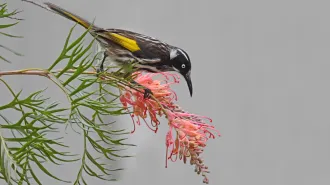A 22-year moratorium on commercial whaling remains unchanged as a meeting of whaling regulators ended June 27 without a vote on some of the most divisive proposals.
Meetings of the International Whaling Commission in recent years have deadlocked over whether some commercial whaling should be allowed. And delegates have traded barbs over whether what Japan calls scientific whaling is just a commercial venture with a legal name.
The maneuvering had grown so divisive that chair William Hogarth led a special session in March on the future of the commission and ways to break out of the impasse. His report from that special session called for fewer big public votes on divisive issues, more emphasis on smaller groups working toward consensus and other changes in the process to create a better negotiating atmosphere.
The commission’s 60th meeting, which just concluded in Santiago, Chile, did not resolve the debates, although some issues played out differently from the way they had in past years.
Japan, once again, did make a case that the moratorium was bringing hardship to its whaling enterprises. The Japanese have been arguing for a change in the moratorium rules to allow some commercial whaling: what’s being called small-type whaling. This year, however, the Japanese delegations did not request a formal vote about changes to the moratorium, and Hogarth thanked them for their cooperative attitude.
At the opposite end of the spectrum, Brazil, Argentina and South Africa brought up a proposal, which they have introduced before, to create a formal whale sanctuary in the South Atlantic. This year the proposers cited the efforts to change the commission processes and did not ask for a formal vote. Again Hogarth praised their approach.
One proposal that did come to a vote was Denmark’s request to permit whalers in west Greenlanders to catch 10 humpbacks a year until 2012. The commission does allow aboriginal subsistence whaling in certain places, but the commission voted down this proposal as not having made a sufficient case for the need for the hunt.
Whaling for scientific purposes is also permitted under the commission’s rules, and until the 1986 moratorium a variety of nations including the United States and Canada used this provision. Recently, only Iceland and Japan have done lethal research. Japan runs the most extensive program, according to the IWC summary, killing 551 Antarctic minke whales in 2007 plus 357 whales of other species.
Under the commission’s current rules, nations submit their scientific plans for review but do not need to implement any recommendations. The commission is working on changing the way these permit proposals are reviewed.
The commission statement released June 27 said the meeting concluded “successfully.” What the impact of this year’s reduced voting will be depends on who’s talking.
“The International Whaling Commission took small procedural steps at the Santiago meeting but now faces a climb as big and steep as the Andes,” says Patrick Ramage of the International Fund for Animal Welfare.






